Embark on an extraordinary journey with our eco-friendly travel tips, designed to minimize your environmental footprint while maximizing your travel experiences. From transportation to accommodation, activities to dining, and packing to responsible practices, we’ve got you covered.
Join us as we explore the art of traveling consciously, respecting local communities, and preserving the pristine beauty of our planet for generations to come.
Transportation
Transportation is a major contributor to greenhouse gas emissions, so making eco-friendly choices when traveling can significantly reduce your carbon footprint.
Public transportation, walking, and biking are all great ways to get around without driving. They’re not only better for the environment, but they’re also often more affordable and convenient.
Choosing the Most Eco-Friendly Mode of Transportation
The most eco-friendly mode of transportation for a particular trip depends on a number of factors, including the distance you’re traveling, the availability of public transportation, and the terrain.
- For short distances, walking or biking is the best option.
- For longer distances, public transportation is a good choice, especially if it’s available in your area.
- If you must drive, try to carpool or use a fuel-efficient vehicle.
Air Travel and Carbon Footprint, Eco-friendly travel tips
Air travel is the most carbon-intensive form of transportation, so it’s important to minimize your air travel if possible.
- Consider taking a train or bus instead of flying for short distances.
- If you must fly, try to book a direct flight, as takeoffs and landings produce the most emissions.
- Choose an airline that has a good environmental record.
Accommodation

Accommodation choices can significantly impact your eco-footprint while traveling. Opting for eco-friendly hotels and guesthouses helps minimize your environmental impact and supports sustainable tourism practices.
Energy efficiency and water conservation are crucial factors to consider when selecting accommodations. Look for establishments that use energy-saving appliances, LED lighting, and motion-sensor lighting systems to reduce energy consumption. Water-saving fixtures, such as low-flow showerheads and toilets, help conserve precious water resources.
Sustainable Practices
- Renewable Energy Sources: Hotels and guesthouses that utilize solar panels, wind turbines, or geothermal energy to generate electricity reduce their carbon footprint.
- Waste Reduction and Recycling: Establishments with comprehensive recycling programs and a commitment to reducing single-use plastics demonstrate a commitment to minimizing waste.
- Water Conservation: Rainwater harvesting systems, xeriscaping (low-water landscaping), and water-efficient appliances contribute to water conservation efforts.
- Sustainable Building Materials: Accommodations constructed using eco-friendly materials, such as bamboo, recycled wood, and low-VOC (volatile organic compound) paints, promote indoor air quality and reduce environmental impact.
- Community Involvement: Hotels and guesthouses that actively engage with local communities, support fair trade practices, and promote cultural heritage contribute to sustainable tourism development.
Activities

Participating in eco-friendly activities and tours not only enriches your travel experience but also supports local communities and minimizes environmental impact. These activities often showcase the natural and cultural heritage of a region while promoting sustainable practices.
Respecting wildlife and natural habitats is paramount. Observe animals from a distance, avoid feeding or disturbing them, and stay on designated trails to minimize disruption to their ecosystem.
Choosing Sustainable Activities
When selecting activities, consider their environmental impact and the involvement of local communities. Look for operators that prioritize conservation, use eco-friendly practices, and support local businesses.
- Opt for guided tours that focus on responsible wildlife viewing, such as birdwatching or whale watching with certified operators.
- Participate in cultural immersion activities that connect you with local traditions, customs, and crafts.
- Choose outdoor adventures like hiking, biking, or kayaking that promote physical well-being while minimizing ecological footprint.
Food and Dining
When traveling, it’s important to consider the environmental impact of your food choices. Eating local and seasonal foods can help reduce greenhouse gas emissions associated with food transportation and promote sustainable farming practices.
The production and transportation of food account for a significant portion of global greenhouse gas emissions. By choosing local and seasonal foods, you can reduce the distance that food travels, which in turn reduces the amount of fuel used for transportation. Additionally, local farmers often use more sustainable farming practices that are better for the environment.
For those looking to reduce their environmental impact while exploring the world, consider incorporating eco-friendly travel tips into your plans. From using reusable water bottles to opting for sustainable transportation, these practices can make a difference. As you plan your upcoming adventures, be sure to check out the best travel destinations for 2024.
These destinations offer a unique blend of natural beauty and eco-conscious initiatives, allowing you to travel responsibly while creating lasting memories.
Reducing Food Waste
- Plan your meals ahead of time to avoid overbuying food.
- Store food properly to prevent spoilage.
- Compost food scraps and organic waste.
- Support restaurants that offer composting programs.
Supporting Sustainable Farming Practices
- Buy organic produce whenever possible.
- Visit local farmers’ markets and support small-scale farmers.
- Choose restaurants that source their ingredients from local farms.
- Learn about sustainable farming practices and support organizations that promote them.
Packing and Gear
Traveling light is not just about convenience; it also helps reduce waste. Pack only the essentials and consider the environmental impact of your packing materials and gear.
Sustainable materials like recycled fabrics, bamboo, and cork are excellent choices for packing cubes, toiletry bags, and backpacks. These materials are durable, lightweight, and biodegradable.
When planning your next family vacation, consider incorporating eco-friendly travel tips to minimize your environmental impact. From choosing sustainable transportation options to opting for accommodations that prioritize conservation, there are many ways to travel responsibly. And with an abundance of family-friendly destinations that offer eco-conscious experiences, such as the best family vacation spots , you can create unforgettable memories while making a positive impact on the planet.
Eco-friendly Packing Tips
- Use reusable containers for liquids and toiletries.
- Pack light to reduce fuel consumption during transportation.
- Choose biodegradable packing materials like cardboard or newspaper.
- Avoid single-use plastics, such as plastic bags and disposable utensils.
Sustainable Gear Recommendations
- Recycled Polyester Backpack: Durable and water-resistant, made from recycled plastic bottles.
- Bamboo Toothbrush: Biodegradable and compostable alternative to plastic toothbrushes.
- Reusable Water Bottle: Reduce plastic waste by carrying a reusable water bottle.
- Cork Travel Mat: Lightweight, non-slip, and made from sustainable cork.
Responsible Travel Practices
As conscientious travelers, it’s crucial to adopt responsible practices that preserve the cultural integrity and natural beauty of our destinations. Respecting local customs, minimizing our environmental impact, and promoting ethical interactions ensure that we leave a positive legacy while enriching our travel experiences.
To foster harmonious interactions, it’s essential to research and respect local customs and traditions. Familiarize yourself with appropriate attire, greetings, and social norms to avoid any cultural misunderstandings. By immersing ourselves in the local culture, we not only show respect but also gain a deeper appreciation for the destination.
When planning an eco-friendly vacation, consider opting for family-friendly resorts that prioritize sustainability. These resorts often incorporate eco-friendly practices, such as using renewable energy sources, reducing waste, and conserving water. By choosing such resorts, you can minimize your environmental impact while enjoying a memorable family vacation.
Minimizing Noise and Light Pollution
Excessive noise and light can disrupt local ecosystems and diminish the tranquility of natural environments. To minimize our impact, let’s observe the following guidelines:
- Keep noise levels low, especially during nighttime hours, to avoid disturbing wildlife and local residents.
- Use flashlights responsibly when exploring natural areas, directing the beam downwards to minimize light pollution.
- Respect designated quiet zones and observe any noise regulations imposed by local authorities.
Avoiding Littering and Protecting Natural Resources
Littering not only detracts from the beauty of our surroundings but also poses a significant threat to wildlife and the environment. To prevent littering and protect natural resources, let’s adhere to the following practices:
- Carry reusable water bottles, containers, and shopping bags to minimize waste.
- Dispose of waste properly in designated bins or carry it out to prevent it from polluting the environment.
- Avoid purchasing single-use plastics and opt for sustainable alternatives whenever possible.
- Respect wildlife and their habitats by not feeding them or disturbing their natural behaviors.
Conclusive Thoughts: Eco-friendly Travel Tips
As you embrace these eco-friendly travel tips, you’ll not only reduce your environmental impact but also create a positive ripple effect that extends far beyond your travels. By making sustainable choices, you become an ambassador for change, inspiring others to follow suit.
Remember, every step you take towards eco-friendly travel is a step towards a greener, more sustainable future for all.
FAQ Insights
What are the benefits of using public transportation instead of driving?
Public transportation reduces air pollution, traffic congestion, and your carbon footprint.
How can I choose the most eco-friendly mode of transportation for my trip?
Consider the distance, terrain, and availability of public transportation, walking, or biking. For longer distances, opt for trains or buses over planes.
What are some tips for packing light and reducing waste?
Choose reusable containers, pack only essentials, and avoid single-use plastics. Consider renting or borrowing gear instead of buying new.